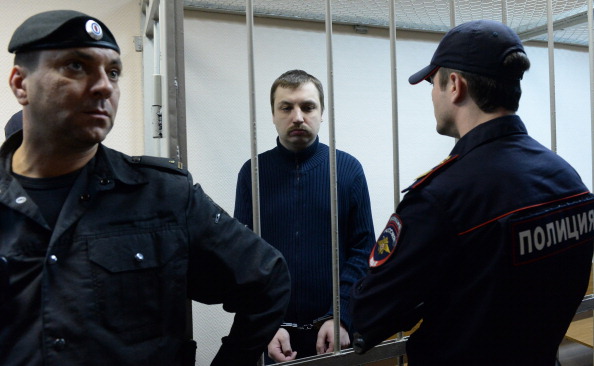
Mikhail Kosenko stands in a defendant cage in a court in Moscow (Photo Credit: Vasily Maximov/AFP/Getty Images).
This blog originally appeared in the Huffington Post.
Mikhail Kosenko was there last year when tens of thousands gathered in Moscow’s Bolotnaya Square in protest of Vladimir Putin’s re-election. Video evidence indicates that he was protesting peacefully, yet he was arrested days later by the Russian authorities and charged with taking part in a riot and using violence against police officers.
Although many are being prosecuted for their involvement that day, Kosenko has been sent by the courts to a psychiatric hospital, where treatment is being forced upon him. The prosecution asserts that he is a threat to himself and others, yet there is no evidence of this.
These days, human rights in Russia are at serious risk. Every day we hear of peaceful protesters being detained by authorities; risks to members of the LGBTI community; and the passage of laws that restrict the rights to freedom of expression, assembly and association. Amnesty International continues to document the many instances of human rights violations in Russia. In a one year period since Vladimir Putin announced his candidacy to return to the president’s office, over 5,000 people were arrested in more than 200 protests.
In a one year period since Vladimir Putin announced his candidacy to return to the president's office, over 5,000 people were arrested in more than 200 protests.
For those of us outside Russia who want to support the courageous many within the country who continue to demand their rights, it is easy to get overwhelmed. If Russians themselves face such obstacles from their own government, how can we help from the outside?
But we also play a critical role. We can make a difference by standing up for individual Russians and human rights NGOs who are targeted for their work. We can put pressure on the Russian government to respect human rights. Put together, our individual actions make a powerful collection that has an impact.
And we’ve seen our collective actions have an impact all over the world. Take the example of Mansour Ossanlu, who was detained numerous times by the Iranian Authorities, most recently in 2007 while returning from a meeting with international trade union colleagues in Europe. Ossanlu is an advocate for workers’ rights in Iran.
Through the annual Write for Rights campaign, thousands joined Amnesty International to call for Ossanlu’s release, and in 2011, he was granted a medical furlough. He currently lives in the United States and told us the following about the impact our individual actions can have: “In this struggle it is very valuable to get so much support from so many thousands of miles away. This campaigning has also disclosed the repression and made sure that the authorities know that they are being watched by the outside world.”
There are many other individuals who have been similarly helped. In 2002, two indigenous women, Inés Fernández Ortega’ and Valentina Rosendo Cantú, were raped by soldiers in separate incidents in Mexico. Instead of taking steps to carry out full and impartial investigations, the military tried to disprove the allegations.
Thousands of letters were written on their behalf. Finally in August 2010, the Inter-American Court of Human Rights issued two binding judgments in favor of both women. The Mexican government is obliged to implement the ruling issued by this Court including undertaking a prompt and impartial investigation into the crimes by civilian institutions and providing remedy and reparations to both women. On August 2011, after 9 years of military impunity, the case was finally turned over to Federal Civilian Jurisdiction, and Public Acts of Acknowledgement were held in 2011 for Valentina and in 2012 for Ines.
In 2005, Birtukan Mideksa was arrested for protesting elections in Ethiopia. She was the leader of the Unity for Democracy and Justice Party. She was released, but then re-arrested. This time the authorities imposed a life sentence on her. Following international pressure, partly in the form of thousands of letters written through Write for Rights, the Ethiopian government released her in 2010. Mideksa spoke to the power that the letters written on her behalf had, “Your letters, phone calls, and petitions were my protection during the months I spent in solitary confinement. You were my voice when I had none.”
Those who wrote on behalf of Mideksa, Inés, Valentina and Mansour were thousands of miles away, yet their words and letters held power and delivered hope and impact. Even though the deteriorating human rights conditions in Russia may seem irreversible – we can still stand up for Mikhail Kosenko, provide him hope and help him attain freedom.
Together through this year’s Write for Rights, held this month, we can stand up for human rights and make a difference in someone’s life. I hope you join us.
Tens of thousands of Russians are demanding transparency, fairness and the freedom to peacefully petition their government.
Regards,
Psychiatrist in Sydney